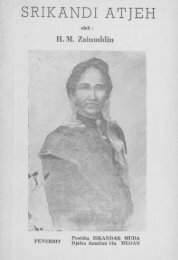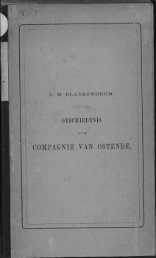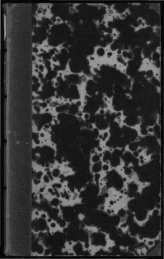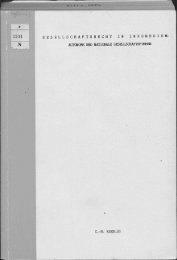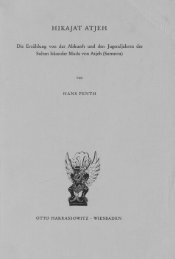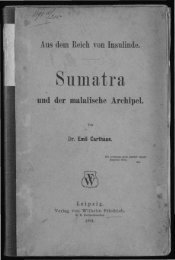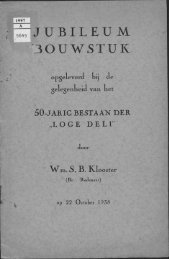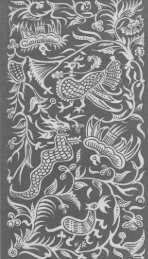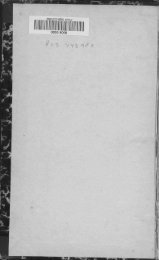- Page 1 and 2: m^mt
- Page 5 and 6: Muslim Peoples
- Page 7 and 8: ,*0W
- Page 9 and 10: Partap C. Aggarwal SHRI RAM CENTER
- Page 11 and 12: CONTRIBUTORS Vll Robert L. Hardgrav
- Page 13 and 14: CONTRIBUTORS IX Abdi A. Sheik-Abdi
- Page 15 and 16: Volume 1 CONTENTS Preface xix Intro
- Page 17 and 18: CONTENTS xiii Fulani 257 Funj 261 F
- Page 19 and 20: CONTENTS XV Mossi 546 Nogai 553 Nub
- Page 21: CONTENTS XV11 Yoruba 872 Yoruk 876
- Page 26 and 27: 20° E 500 Km EASTERN MEDITERRANEAN
- Page 28 and 29: UJ o O jQ "" O CD £ _ Q o - O w C
- Page 33: Muslim Peoples
- Page 36 and 37: 454 MABA the centuries have adopted
- Page 38 and 39: 456 MABA division of the village po
- Page 40 and 41: 458 MADURESE Works, John A. "Wither
- Page 44 and 45: 462 MAGUINDANAO leader. Medeldeling
- Page 46 and 47: 464 MAGUINDANAO warriors (see Sama)
- Page 48 and 49: 466 MAGUINDANAO which in recent yea
- Page 50 and 51: 468 MAHARASHTRIANS from north India
- Page 52 and 53: 470 MAKASSARESE bration of marriage
- Page 54 and 55: 472 MALAYO-POLYNESIAN-SPEAKING PEOP
- Page 56 and 57: 474 MALAYO-POLYNESIAN-SPEAKING PEOP
- Page 58 and 59: 476 MALAYO-POLYNESIAN-SPEAKING PEOP
- Page 60 and 61: 478 MALAYS century, and even into t
- Page 62 and 63: 480 MALAYS . The Malays: Their Prob
- Page 64 and 65: 482 MANDING-SPEAKING PEOPLES used w
- Page 66 and 67: 484 MANDING-SPEAKING PEOPLES Mali p
- Page 68 and 69: 486 MANDINKA Article Dieterlen, G.
- Page 70 and 71: 488 MANDINKA over social and religi
- Page 72 and 73: 490 MANDINKA for their abilities to
- Page 74 and 75: 492 MAPPILLA In Conflict and Harmon
- Page 76 and 77: 494 MAPPILLA The mosques of Kerala
- Page 78 and 79: 496 MARANAO pinos and foreign colon
- Page 80 and 81: 498 MARANAO returned to teach in lo
- Page 82 and 83: 500 MASALIT The Masalit, and a grou
- Page 84 and 85: 502 MASALIT wife's mother still exp
- Page 86 and 87: 504 MEIDOB Kapteijns, L. "The Emerg
- Page 88 and 89: 506 MEIDOB time, when political and
- Page 90 and 91: 508 MELANAU Articles Lampen, G. D.
- Page 92 and 93:
510 MELANAU category of his father.
- Page 94 and 95:
512 MELANAU officers and religious
- Page 96 and 97:
514 MENDE of peak labor input by co
- Page 98 and 99:
516 MENDE BIBLIOGRAPHY Books Abraha
- Page 100 and 101:
518 MEOS ancient raga traditions of
- Page 102 and 103:
520 MEOS Muslim manner, but most of
- Page 104 and 105:
522 MIMA-MIMI Historians have not i
- Page 106 and 107:
524 MINANGKABAU important character
- Page 108 and 109:
526 MINANGKABAU return, they are tr
- Page 110 and 111:
528 MOGHOLS . "Some Notes on the Ta
- Page 112 and 113:
530 MOGHOLS of their neighbors to t
- Page 114 and 115:
532 MOLBOG water." Tradition says t
- Page 116 and 117:
534 MOLBOG builds its own house, us
- Page 118 and 119:
536 MOLE-DAGBANE-SPEAKING PEOPLES A
- Page 120 and 121:
538 MOLE-DAGBANE-SPEAKING PEOPLES c
- Page 122 and 123:
540 MOLE-DAGBANE-SPEAKING PEOPLES S
- Page 124 and 125:
542 States: Dagomba Books MOLE-DAGB
- Page 126 and 127:
544 MOORS . "Migration and Tribal I
- Page 128 and 129:
546 MOSSI similar characteristics.
- Page 130 and 131:
548 MOSSI is red with laterite. Dai
- Page 132 and 133:
550 MOSSI exposes individuals to th
- Page 134 and 135:
552 MOSSI Tarr, Delbert Howard. "In
- Page 136 and 137:
554 NUBA Islam came to the Nogai Ho
- Page 138 and 139:
556 NUBA had distinct political dev
- Page 140 and 141:
558 NUBA the kujur, who were often
- Page 142 and 143:
560 NUBIANS Historically, the Nubia
- Page 144 and 145:
562 NUBIANS pronounced in this area
- Page 146 and 147:
564 NUBIANS . La Nubia Medioevale.
- Page 148 and 149:
566 NUPE language of these classes,
- Page 150 and 151:
568 NUPE from this era as well. Cer
- Page 152 and 153:
570 NURISTANIS "Land of Infidels,"
- Page 154 and 155:
572 NURISTANIS symbolized in instit
- Page 156 and 157:
574 NYAMWEZI to a Communist Afghani
- Page 158 and 159:
576 NYAMWEZI ucation which requires
- Page 160 and 161:
578 NYANKOLE Finucane, J. R. Rural
- Page 162 and 163:
580 NYANKOLE government service tha
- Page 164 and 165:
582 NYANKOLE Ganda). These factions
- Page 166 and 167:
584 OGAN-BESEMAH Present provincial
- Page 168 and 169:
586 ORISSANS is an occasion for the
- Page 170 and 171:
588 ORISSANS feeding is not possibl
- Page 172 and 173:
590 OROMO ship among girls is commo
- Page 174 and 175:
592 OROMO educated Oromo. It is iro
- Page 176 and 177:
594 OROMO Although there are so man
- Page 178 and 179:
596 OSSETIANS Hultin, J. "Social St
- Page 180 and 181:
598 OSSETIANS such as the transfer
- Page 182 and 183:
PASHAI 601 temporary Pashai mountai
- Page 184 and 185:
PASHAI 603 at present modern small
- Page 186 and 187:
*X?ri PERSIANS 605 Iran and Afghani
- Page 188 and 189:
*J&r* PERSIANS 607 urban social sys
- Page 190 and 191:
K&r • PERSIANS 609 trend among th
- Page 192 and 193:
PERSIANS 611 Coon, Carleton S. Cara
- Page 194 and 195:
*3Zr^ POMAKS 613 forced to convert
- Page 196 and 197:
POMAKS 615 closing the the Greek bo
- Page 198 and 199:
i-V i-_ T~- £ V. ~£„ i^ftrr* PU
- Page 200 and 201:
PUNJABIS 619 village may be dominat
- Page 202 and 203:
PUNJABIS 621 BIBLIOGRAPHY Books Ahm
- Page 204 and 205:
PUSHTUN 623 or herdsmen. They raise
- Page 206 and 207:
PUSHTUN 625 Idle young men in villa
- Page 208 and 209:
~ftrrr=^-r^j- PUSHTUN 627 of 1979 a
- Page 210 and 211:
PUSHTUN 629 Howell, Evelyn. Mizh: A
- Page 212 and 213:
*?r- Q QASHQA'I The Qashqa'i, one o
- Page 214 and 215:
*/" QASHQA'I 633 alism and urban wa
- Page 216 and 217:
^r- QASHQA'I 635 Shiraz to make or
- Page 218 and 219:
^M" QIZILBASH 637 Duncan, David Dou
- Page 220 and 221:
QIZILBASH 639 Afghan Khorasan and B
- Page 222 and 223:
QIZILBASH 641 constantly felt waves
- Page 224 and 225:
R RESHAWA They call themselves Resh
- Page 226 and 227:
RESHAWA 645 refrains from praying a
- Page 228 and 229:
s SADAMA The Ethiopian people who r
- Page 230 and 231:
SADAMA 649 be chronologically old,
- Page 232 and 233:
gjv 1 SADAMA 651 minor spirit being
- Page 234 and 235:
SALARS 653 by Mahmud al Kashgari an
- Page 236 and 237:
SAMA 655 derive from a migration in
- Page 238 and 239:
SAMA 657 munities may contain two o
- Page 240 and 241:
SANGIL 659 Pallesen, Kemp. "Recipro
- Page 242 and 243:
JJE^l SASAK 661 occupation. In the
- Page 244 and 245:
SASAK 663 The religious organizatio
- Page 246 and 247:
SENUFO 665 cifically applied to the
- Page 248 and 249:
SENUFO 667 some of the reasons stat
- Page 250 and 251:
SERER 669 the most vigorously. Both
- Page 252 and 253:
SHAHSEVAN 671 sevan differ from oth
- Page 254 and 255:
SHAHSEVAN 673 The Iranian New Year
- Page 256 and 257:
SHANGAWA 675 sixteenth century a Mo
- Page 258 and 259:
SHANGAWA 677 A corpse is buried wit
- Page 260 and 261:
- J»_-y jr.^y -7 v> SHINA-SPEAKING
- Page 262 and 263:
• *•-- *„- ;—-TV.. SHINA-SP
- Page 264 and 265:
SHINA-SPEAKING PEOPLES 683 about th
- Page 266 and 267:
SINDHIS 685 Approximately 93 percen
- Page 268 and 269:
SINDHIS 687 for the family's affair
- Page 270 and 271:
SINDHIS 689 Crops grown include whe
- Page 272 and 273:
SINYAR 691 the east by the Fur and
- Page 274 and 275:
SINYAR 693 Masalit Native Administr
- Page 276 and 277:
SOGA 695 Articles Doornbos, Paul. "
- Page 278 and 279:
SOGA 697 administration but also in
- Page 280 and 281:
SOMALIS 699 activities produce meag
- Page 282 and 283:
SOMALIS 701 conflict. Two cases in
- Page 284 and 285:
SOMALIS 703 Success," a philosophic
- Page 286 and 287:
SONGHAY 705 Luling, Virginia. "Soma
- Page 288 and 289:
SONGHAY 707 communities of Songhay
- Page 290 and 291:
SONINKE 709 such sites, drawing the
- Page 292 and 293:
SONINKE 711 cleric is elected for l
- Page 294 and 295:
soso 713 of Soso settlements came t
- Page 296 and 297:
soso 715 future husband gives prese
- Page 298 and 299:
^i soso 717 In the more orthodox se
- Page 300 and 301:
SOUTH AFRICANS 719 terms designed t
- Page 302 and 303:
SOUTH AFRICANS 721 eroded, partly b
- Page 304 and 305:
SRI LANKANS 723 Desai, B., and Marn
- Page 306 and 307:
SRI LANKANS 725 There is considerab
- Page 308 and 309:
SUNDANESE 727 order, also do, but s
- Page 310 and 311:
SUNDANESE 729 the defeat of the Sum
- Page 312 and 313:
yp> SUNDANESE 731 BIBLIOGRAPHY Book
- Page 314 and 315:
SWAHILI 733 with the Persian Gulf.
- Page 316 and 317:
SWAHILI 733 with the Persian Gulf.
- Page 318 and 319:
SWAHILI 735 public, worn over eithe
- Page 320 and 321:
SWAHILI 737 Lienhardt, Peter. "Cont
- Page 322 and 323:
w T TAJIK The Tajik of Central Asia
- Page 324 and 325:
^^ TAJIK 741 creep up the walls unt
- Page 326 and 327:
TAJIK 743 mothers are walking encyc
- Page 328 and 329:
TAMA-SPEAKING PEOPLES 745 Slobin, M
- Page 330 and 331:
TAMA-SPEAKING PEOPLES 747 Masalit b
- Page 332 and 333:
wr TAMA-SPEAKING PEOPLES 749 of Tam
- Page 334 and 335:
W" TAMA-SPEAKING PEOPLES 751 centur
- Page 336 and 337:
TAMA-SPEAKING PEOPLES 753 Shali and
- Page 338 and 339:
TAQALI 755 Small villages dot the p
- Page 340 and 341:
TAQALI 757 Both men and women farm,
- Page 342 and 343:
TATARS 759 called themselves Turks,
- Page 344 and 345:
TATARS 761 substantial private prop
- Page 346 and 347:
TATARS 763 BIBLIOGRAPHY Books Allwo
- Page 348 and 349:
TAUSUG 765 contain Islam in the sou
- Page 350 and 351:
TAUSUG 767 they may reside with the
- Page 352 and 353:
TAUSUG 769 (and Samal) society. Man
- Page 354 and 355:
TEBU 771 therefore, the people of T
- Page 356 and 357:
TEBU 773 basic difference in social
- Page 358 and 359:
TEMNE 775 kola, enter the market as
- Page 360 and 361:
TEMNE 777 schools. In general the i
- Page 362 and 363:
TERNATAN-TIDORESE 779 Gamble, David
- Page 364 and 365:
TERNATAN-TIDORESE 781 system of ann
- Page 366 and 367:
w* THAIS 783 of having a great deal
- Page 368 and 369:
THAIS 785 property indefinitely. Th
- Page 370 and 371:
THAIS 787 Pattani. All stress the g
- Page 372 and 373:
TOMINI 789 BIBLIOGRAPHY Books Bauer
- Page 374 and 375:
V" TOMINI 791 shift from matrilater
- Page 376 and 377:
TUKULOR 793 ernment cooperatives fo
- Page 378 and 379:
TUKULOR 795 The middle class, rimbe
- Page 380 and 381:
TUNJUR 797 leaves open the question
- Page 382 and 383:
TURKIC-SPEAKING PEOPLES 799 both in
- Page 384 and 385:
TURKIC-SPEAKING PEOPLES 801 In the
- Page 386 and 387:
TURKIC-SPEAKING PEOPLES 803 main la
- Page 388 and 389:
TURKMEN 805 An alternative spelling
- Page 390 and 391:
TURKMEN 807 lived only in tents and
- Page 392 and 393:
TURKMEN 809 Nurture? AAAS Selected
- Page 394 and 395:
TURKS, ANATOLIAN 811 veloped, and f
- Page 396 and 397:
("^ TURKS, ANATOLIAN 813 Enthusiasm
- Page 398 and 399:
TURKS, ANATOLIAN 815 depended on th
- Page 400 and 401:
TURKS, ANATOLIAN 817 , and Tumertek
- Page 402 and 403:
TURKS, RUMELIAN 819 Contact on Trad
- Page 404 and 405:
TURKS, RUMELIAN 821 territories, fo
- Page 406 and 407:
u URDU-SPEAKING PEOPLES The Urdu-sp
- Page 408 and 409:
URDU-SPEAKING PEOPLES 825 gamous (a
- Page 410 and 411:
V" URDU-SPEAKING PEOPLES 827 are kn
- Page 412 and 413:
URDU-SPEAKING PEOPLES 829 and Socia
- Page 414 and 415:
UYGUR 831 on either side of the Bog
- Page 416 and 417:
UZBEK 833 Pickens, Claude L., Jr. A
- Page 418 and 419:
UZBEK 835 a modernization program w
- Page 420 and 421:
UZBEK 837 In pre-revolutionary Tran
- Page 422 and 423:
UZBEK (AFGHANISTAN) 839 Uzbek commu
- Page 424 and 425:
UZBEK (AFGHANISTAN) 841 frame. Felt
- Page 426:
UZBEK (AFGHANISTAN) 843 Schurmann,
- Page 429 and 430:
846 VAI activities. Chattel slaves
- Page 431 and 432:
I5«
- Page 433 and 434:
850 WANA very sense of being a "peo
- Page 435 and 436:
852 WAYTO for themselves a religion
- Page 437 and 438:
854 WAYTO mechanism around the Wayt
- Page 439 and 440:
856 WOLOF Murdock, George P. Africa
- Page 441 and 442:
858 WOLOF one wife; it is generally
- Page 443 and 444:
860 WOLOF and so on—place themsel
- Page 446 and 447:
Y YAKAN The Yakan are one of the Mu
- Page 448 and 449:
YAKAN 865 always belong to her. Inh
- Page 450 and 451:
YALUNKA 867 Sporadic relations with
- Page 452 and 453:
YALUNKA 869 of any size contains at
- Page 454 and 455:
YAO 871 married matrilocally, the h
- Page 456 and 457:
YORUBA 873 Recent interpretations o
- Page 458 and 459:
YORUBA 875 favoring Islam. Further,
- Page 460 and 461:
YORUK 877 (Izmir) provinces still c
- Page 462:
YORUK 879 . The Yoruk of Southeaste
- Page 465 and 466:
1 9 1 hJ s ^H ^•ff § £ K7^ ^P O
- Page 467 and 468:
H I a. Ss •S 1 6, e w 3 3 = £ c
- Page 469 and 470:
33 z u •2 -2 I 1 S 3 Ji a. HI 111
- Page 471 and 472:
n Z gl. r £ u O "3 x a s a o a. E.
- Page 473 and 474:
z .5 2 1 a s o W s s .2 -2 I i 5
- Page 475 and 476:
3 2 >> 2 a 8- O a II 11 3"3 ! § §
- Page 477 and 478:
#o "— as Z a 3 2 >> £ w •2 -2
- Page 479 and 480:
a #o a Z a 1 ca ft, o 5 w c 6 •I
- Page 481 and 482:
^ w B 5 •2 -2 I 1 * I 3 a < 8 it;
- Page 483 and 484:
o w .2 -2 I i 5 -1 - i3 C3 I if 5
- Page 485 and 486:
a — ca Z £ 2 >. 1 ft. o >> s o '
- Page 487 and 488:
ca z 1 2 I 2 o X a s X U4 * 3 CN ON
- Page 489 and 490:
I 1 ca ft. u O "3 X o fad s s •2
- Page 491 and 492:
a Z s 2 >. 2 & a 3 O Lo fad 5 -S *
- Page 493 and 494:
a z J a 2 1 ft. a s o u U fad J -S
- Page 496 and 497:
APPENDIX 2. MUSLIMS AND THEIR ETHNI
- Page 498 and 499:
Ethnic Group •Beri •Berti Besem
- Page 500 and 501:
Ethnic Group •Fongoro Fra-Fra; se
- Page 502 and 503:
Ethnic Group Kathmandu Valley (Sout
- Page 504 and 505:
Ethnic Group •Masalat-Masalit Mas
- Page 506 and 507:
Ethnic Group Plateau Chadic Pogoro
- Page 508 and 509:
Ethnic Group •Sundanese "Susu"; s
- Page 510:
Ethnic Group Zaghawa (Beri) Zaramo
- Page 513 and 514:
Ethnic Group Hazaras Soninke Tamil
- Page 515 and 516:
932 INDEX Ahmadiyas, xxxiv, 341, 49
- Page 517 and 518:
934 Bedouin, 37-39 Bedras, 468 Beek
- Page 519 and 520:
936 INDEX Cotabato, 462 Cousin, as
- Page 521 and 522:
938 Fundamentalism, religious, xxxv
- Page 523 and 524:
940 INDEX Indo-Mauritians, 341-343
- Page 525 and 526:
942 INDEX Kinyaturu (language), 101
- Page 527 and 528:
944 INDEX Mallam, mallamai, xxxi; a
- Page 529 and 530:
946 INDEX Naming, importance of, 41
- Page 531 and 532:
948 INDEX Qashqa'i, Khosrow Khan, 6
- Page 533 and 534:
950 INDEX Shipbuilding, in south Su
- Page 535 and 536:
952 INDEX Traores, 665 Tregami, 571
- Page 537:
About the Editor RICHARD V. WEEKES



